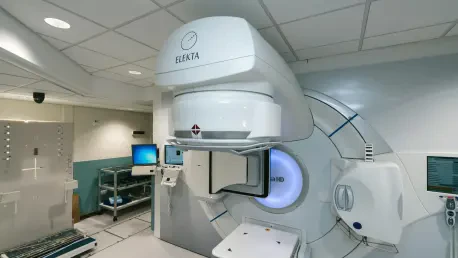Nasopharyngeal carcinoma, a challenging foe of the throat, demands a cutting-edge weapon. Standard radiotherapy often seems like a game of chance, beneficial for some, yet elusive for others. Enter machine learning—a revelation poised to change the rules of engagement, offering patients treatment precision like never before.
The Intersection of Technology and Oncology
The promise of machine learning in the field of oncology is a beacon of hope. Can it transform radiotherapy outcomes for individuals battling nasopharyngeal carcinoma (NPC)? The question rises amidst the critical need to predict treatment responses and enhance patient care. As the world of cancer therapy marches toward personalization, the integration of machine learning holds vast potential.
Unraveling Radiotherapy Resistance in NPC
Nasopharyngeal carcinoma originates from the nasopharynx and is predominantly treated with radiotherapy. Yet, one-third of NPC patients face an unacceptable reality: relapse. This resistance has long challenged oncologists, underlining a broader healthcare imperative to improve the personalization of cancer treatment. A solution emerged to address this persistent hurdle—aimed at discerning which patients stand to benefit the most from radiation therapy.
Innovation Shaped by DatThe NPC-RSS Model
In response to treatment resistance, researchers developed the Nasopharyngeal Carcinoma Radiotherapy Sensitivity Score (NPC-RSS). This innovative model leverages an 18-gene signature and advanced machine learning, yielding promising accuracy in predicting patient-specific radiosensitivity. Through analysis and evaluation of over 100 algorithm combinations, the model’s potential to optimize treatment strategies is brought to light. Evidence underscores its transformative role—NPC-RSS offers a pathway to tailor treatment strategies meticulously.
Genes and the Immune System: The Cornerstones of Precision
The study shone light on critical genes such as SMARCA2, DMC1, and CD9. These genes were linked to key signaling pathways, influencing the immune dynamics within tumors. A direct correlation between tumor immune infiltration and treatment outcomes was observed, offering experts like Dr. Hui Meng fresh insights. Integrating genomic data with treatment strategies promises to revolutionize NPC care. This focus on precision medicine translates to more targeted interventions—a boon for patients.
Clinical Relevance and Future Pathways
The NPC-RSS model presents game-changing applications for clinicians and patients alike. By using genetic scoring to refine treatment approaches, the model can minimize unnecessary radiation exposure while enhancing therapeutic outcomes. This marks a new chapter in clinical decision-making, with steps like increased collaborations and expanded research paving the way. As the study broadens its scope, potential clinical tools are being crafted to offer insights and improve treatment efficacy.
Envisaging Future Horizons
As the paradigm of cancer treatment evolved, the study’s revelations etched a future where precision medicine became a staple. Machine learning unlocked doors for tailor-made therapy based on one’s genetic blueprint—signifying not just an achievement in cancer care but in medicine as a whole. Researchers aimed higher and sought to expand and refine models like NPC-RSS, widening the sphere of innovative solutions. Spanning disciplines and blurring borders, such progress promised to dismantle historical healthcare barriers, heralding a new dawn for patients worldwide.









